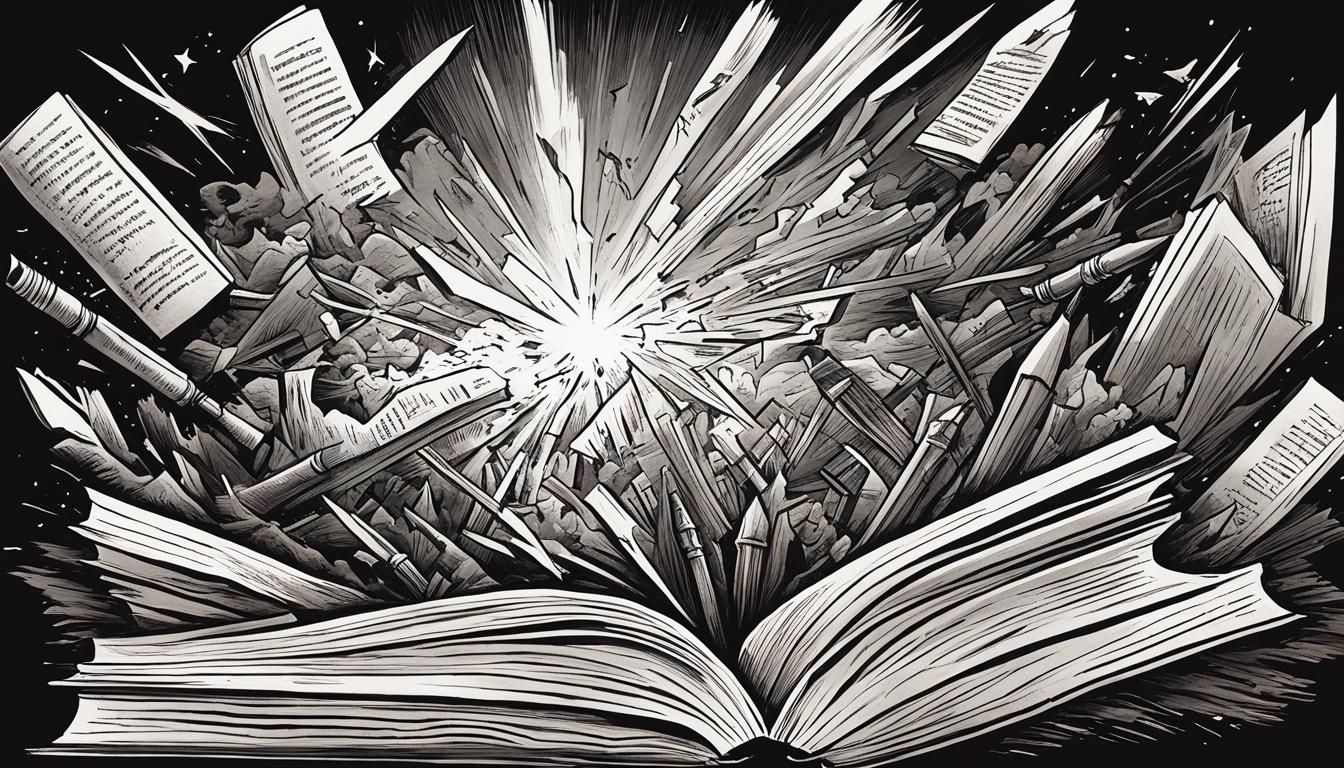Welcome to our book review and critique of ‘A Reader’s Manifesto.’ This renowned book offers a scathing analysis of the modern literary scene and the literary pretentiousness that characterizes it. In this article, we will explore the key arguments put forward by the author and discuss its impact on contemporary American literature. Stay with us to discover more about the book summary and critique of modern literature’s growing pretentiousness.
Understanding Literary Pretentiousness
In today’s modern literature, the term “literary pretentiousness” refers to writing that prioritizes complex vocabulary, obscure language, and convoluted syntax over the meaningful and clear communication of ideas. This type of writing often results in an inaccessible and elitist text, where the true meaning is concealed behind layers of unnecessary complexity.
The characteristics of pretentious writing can include overuse of jargon, excessive adjectives, pompous language, and convoluted prose. Pretentious writers may focus more on showing off their writing skills than on conveying a clear message to their readers.
Understanding literary pretentiousness is crucial in evaluating the quality and relevance of contemporary literature. We must ask ourselves whether complexity and literary acrobatics that do not add to the overall message and meaning of the work should be prioritized over clarity and accessibility.
The Rise of Pretentiousness in American Literature
Over the years, the literary landscape in America has undergone significant changes, with modern literature experiencing an increase in pretentiousness. This pretentiousness can be attributed to several cultural and societal factors that have contributed to the evolution of American literature.
| Factors contributing to the rise of pretentiousness in American literature |
|---|
| 1. The desire for intellectual elitism |
| 2. The influence of academia and literary critics |
| 3. The pursuit of commercial success |
| 4. The pressure to conform to established literary norms |
Some authors intentionally use complex language and obscure references to create a veneer of intellectualism, while others strive to cater to the tastes of literary critics or gain commercial success by conforming to certain established norms.
“The pretentiousness of some modern literature can be seen as an attempt to assert dominance over readers and establish a sense of intellectual superiority.”
As a result of this rise in pretentiousness, readers may feel alienated from the literary world or struggle to comprehend the meaning of certain works. It has also contributed to the notion that literature is primarily an elitist pursuit, rather than a means of enjoyment and enlightenment for all.
‘A Reader’s Manifesto’: Overview and Key Arguments
‘A Reader’s Manifesto’ is a book written by B. R. Myers, published in 2002. The book is a scathing critique of what Myers considers the increasing literary pretentiousness found in contemporary American prose. Myers argues that writers have abandoned the basic principles of good writing, such as clarity and coherence, in favor of overly complex and opaque prose that serves to alienate readers.
In his book, Myers presents a thorough analysis of the issue and provides a detailed overview of the common characteristics of pretentious writing styles. He argues that such styles serve to exclude all but a small minority of readers and that this trend has led to a decline in the quality of modern literature.
One of the main arguments in the book is that literary criticism has failed to hold writers accountable for producing high-quality writing. According to Myers, critics have instead focused their attention on promoting a particular type of writing that values complexity and difficulty over clarity and accessibility.
Myers’ manifesto has been controversial since its publication, with some critics accepting his arguments while others dismiss them as elitist and simplistic. Overall, however, the book has been recognized as an essential contribution to the ongoing debate about the state of contemporary American literature.
“The literary world will doubtless regard ‘A Reader’s Manifesto’ as a fierce polemic rather than a work of scholarship, but however one chooses to classify it, there’s little denying its force.”
Critique of Pretentious Writing Styles
When it comes to pretentious writing, certain styles and techniques tend to be more prevalent than others. One such style is the use of needlessly complex language and syntax to convey a simple idea. This can result in convoluted sentences that are difficult to parse, hindering the reader’s enjoyment and comprehension.
Another common tactic used by pretentious writers is name-dropping. Whether it be obscure literary references or esoteric jargon from a specialized field, the inclusion of such references can create an air of intellectualism that may mask a lack of substance.
The use of flashy imagery, metaphors, and similes is yet another hallmark of pretentious writing. While effective use of such literary devices can enhance a piece of writing, overindulging in them can come across as forced and contrived.
“Good prose should be transparent, like a windowpane.” – George Orwell
As George Orwell suggests, good writing should strive for clarity and coherence above all else. Pretentious writing styles can often sacrifice these qualities in favor of perceived sophistication. While such styles may appeal to some readers, they ultimately hinder the accessibility and universality of a piece of writing.

Impact on the Readership and Literary Landscape
The use of pretentious writing styles in American literature can have a significant impact on both the readership and the literary landscape. When writers prioritize style over substance, readers may be turned off by the elitist language and complex vocabulary, limiting the accessibility of the work. This, in turn, may result in a narrower readership and a less diverse literary landscape.
Moreover, the perception of elitism associated with pretentious writing may contribute to the exclusion of underrepresented and marginalized voices from the literary canon. When writers prioritize form over content, they risk alienating readers who may not share their background or education. This creates a self-perpetuating cycle where only a select few voices are considered “worthy” of inclusion in the literary canon.
The Effects of Changing Reader Expectations
As readers become more discerning, they are less likely to tolerate writing that is needlessly complex or pretentious. By demanding substance over style, readers can help reshape the literary landscape and encourage writers to prioritize clear communication over empty verbosity.
“Simplicity is the key to effective communication. Writers must learn to strip away the extraneous details and focus on communicating ideas clearly and efficiently.”
Increasing Accessibility and Diversity
By challenging pretentious writing, we can create a more inclusive and diverse literary landscape that reflects a wider range of perspectives and experiences. This requires writers to take an active role in shaping their craft and rejecting the notion that complexity and exclusivity are necessary for literary excellence.
Reception and Controversy Surrounding ‘A Reader’s Manifesto’
Upon its publication, A Reader’s Manifesto garnered significant attention and divided opinions in the literary world. While some praised it as a much-needed critique of the growing pretentiousness in American literary prose, others dismissed it as a narrow-minded rant against modern literature.
The book’s reception was largely influenced by the controversial reputation of its author, B. R. Myers, who had previously gained notoriety for his scathing reviews of contemporary literature for The Atlantic magazine.
“Myers’s manifesto is a skilful, courageous and very thorough attack on pretentiousness in literature.”
– Richard Eder, The New York Times
“This wretched little book of his is a flop, and even as the expression of a populist backlash against the contemporary literary novel, it is unlikely ever to be anything else. ”
– James Wood, The New Republic
The debate surrounding A Reader’s Manifesto continues to this day, with some critics praising it as a seminal work in the field of literary criticism, while others dismiss it as a misguided diatribe against modern literature.
A Call for Rewriting the Literary Canon
As ‘A Reader’s Manifesto’ points out, the literary canon is made up of a selective group of works that are considered to be valuable and important in literature. However, this canon is far from perfect, with many works being excluded due to factors such as race, gender, or class. Therefore, the book proposes a revision of the literary canon, suggesting that we need to rewrite it to include diverse perspectives that have been previously overlooked.
‘A Reader’s Manifesto’ challenges the established norms of what is considered valuable and important in literature, arguing that we need to look beyond traditional Western literary standards and values. By doing so, we can broaden our understanding of literature, making it more inclusive and representative of the diverse world we live in.
The revision of the literary canon is not simply about adding works by underrepresented authors, but also about re-evaluating the works that have been included in the canon. We need to critically examine these works and question why they have been deemed valuable, challenging the underlying assumptions and biases that have led to their inclusion.
In rewriting the literary canon, we can create a more dynamic and diverse literary landscape that reflects the realities of our society. By doing so, we can ensure that literature remains relevant and meaningful to readers from all backgrounds and perspectives.
Conclusion: Reflecting on Literary Pretentiousness
After exploring the rise of pretentiousness in American literature and the arguments against it presented in ‘A Reader’s Manifesto,’ it is clear that the literary world must reflect on the impact of pretentiousness on readership and the literary landscape. While literary pretentiousness may appear to elevate the perceived intellectual stature of a work, it ultimately limits accessibility and creates an aura of elitism that can drive away potential readers.
By critiquing the specific writing styles associated with literary pretentiousness, ‘A Reader’s Manifesto’ offers a path forward in creating more enjoyable and meaningful reading experiences. The proposed revision of the literary canon challenges established norms and embraces diverse voices, allowing literature to more accurately reflect the world we live in.
In reflecting on this issue, it is clear that literary pretentiousness is not merely a stylistic choice, but a reflection of larger cultural and societal influences. By examining and critiquing its presence in literature, we can work towards a more inclusive and rewarding reading experience for all.
FAQ
What is ‘A Reader’s Manifesto’ about?
‘A Reader’s Manifesto’ is a book that critiques the growing pretentiousness in contemporary American literary prose.
What is literary pretentiousness?
Literary pretentiousness refers to writing that is characterized by an inflated sense of self-importance, using excessive and unnecessary complexity to prioritize style over substance.
Why has pretentiousness risen in American literature?
The rise of pretentiousness in American literature can be attributed to various cultural and societal influences, which have shaped the literary landscape and the preferences of writers and readers.
What are the key arguments in ‘A Reader’s Manifesto’?
‘A Reader’s Manifesto’ presents arguments against pretentiousness in American literary prose, emphasizing the importance of clarity, simplicity, and genuine storytelling.
Can you provide examples of pretentious writing styles?
Some examples of pretentious writing styles include convoluted syntax, excessive use of jargon or obscure vocabulary, and an overemphasis on artistic experimentation rather than conveying a meaningful message.
How does pretentious writing impact readers and the literary landscape?
Pretentious writing can limit accessibility and hinder readers’ enjoyment and comprehension. It also contributes to the perception of elitism within the literary community.
What has been the reception and controversy surrounding ‘A Reader’s Manifesto’?
‘A Reader’s Manifesto’ has garnered both praise and criticism, with differing reactions to its critique of modern literature and its proposed solutions to combat pretentiousness.
How does ‘A Reader’s Manifesto’ propose rewriting the literary canon?
‘A Reader’s Manifesto’ suggests a revision of the established literary canon, challenging the norms of what is traditionally considered valuable and important in literature.
What is the significance of reflecting on literary pretentiousness?
Reflecting on literary pretentiousness allows us to analyze its impact on contemporary American literature and consider alternative approaches to writing that prioritize clarity and meaningful storytelling.



